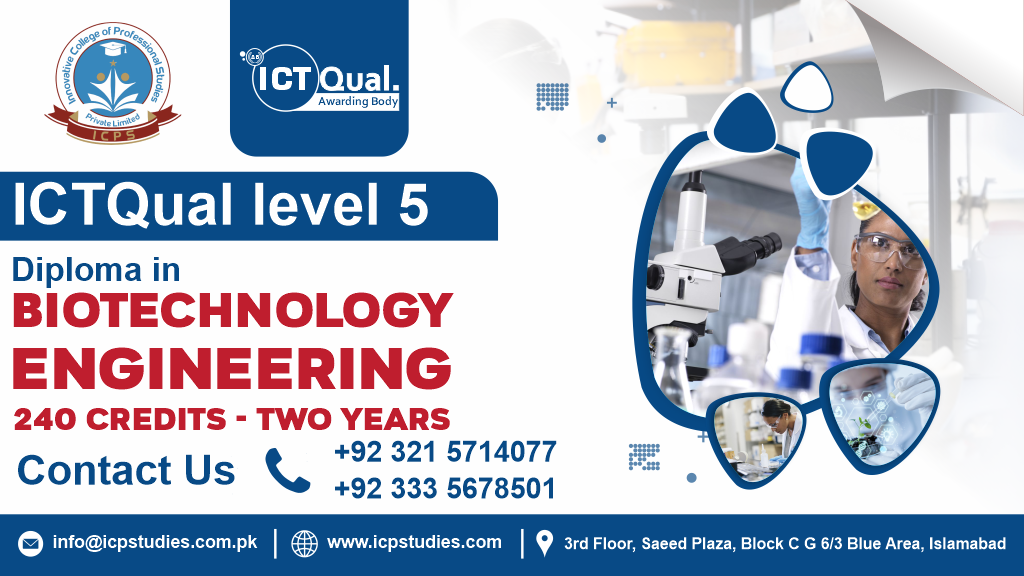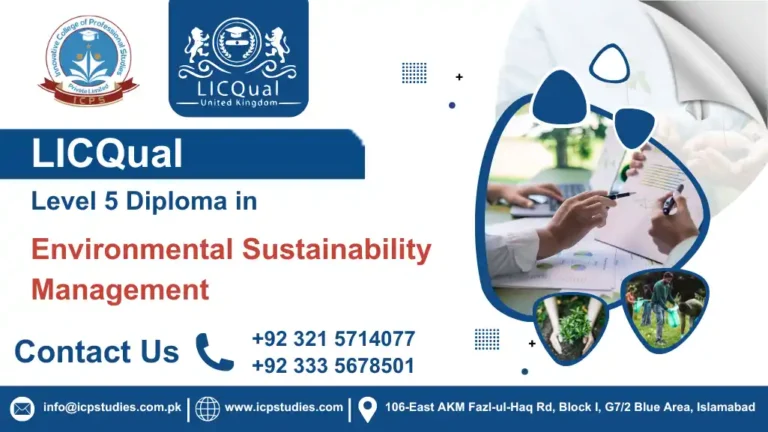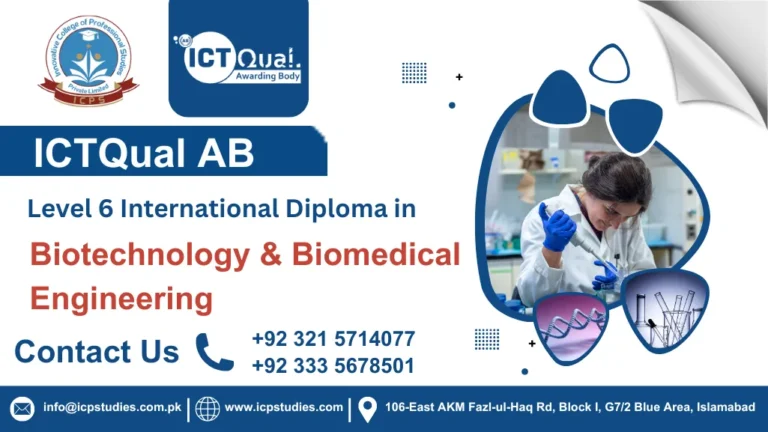The ICTQual Level 5 Diploma in Biotechnology Engineering (240 Credits) is an advanced two-year qualification designed for individuals looking to gain specialized expertise in the field of biotechnology and engineering. This qualification offers an in-depth understanding of the principles of biotechnology, alongside the technical skills necessary to apply this knowledge to real-world engineering problems. It covers a broad spectrum of topics ranging from genetic engineering to bioinformatics, ensuring that graduates are prepared to make significant contributions to the growing biotechnology sector.
The ICTQual Level 5 Diploma in Biotechnology Engineering is a comprehensive two-year program, offering 240 credits upon successful completion. The curriculum integrates theoretical knowledge with practical skills, providing students with the tools necessary to address the challenges and opportunities within the biotechnology field.
The ICTQual Level 5 Diploma in Biotechnology Engineering is an advanced qualification that prepares students for exciting and rewarding careers in the biotechnology and engineering sectors. By combining rigorous scientific learning with practical engineering skills, this two-year program offers students the expertise needed to thrive in industries where biology and technology intersect. Whether you are starting your career or looking to specialize in biotechnology, this course provides the knowledge and skills necessary to make a significant impact on the biotechnology industry.
All About ICTQual Level 5 Diploma in Biotechnology Engineering 240 Credits – Two Years
Course Overview
The ICTQual Level 5 Diploma in Biotechnology Engineering (240 Credits) is a comprehensive two-year qualification designed for individuals aiming to build a career in the rapidly evolving biotechnology industry. This advanced diploma equips students with the in-depth knowledge and practical skills required to excel in the intersection of biology, engineering, and technology.
Biotechnology engineering is a multidisciplinary field that applies biological science to develop solutions for industries such as healthcare, pharmaceuticals, agriculture, and environmental sustainability. Through this course, students will gain expertise in key areas such as genetic engineering, bioinformatics, bioprocessing, and bioengineering principles. Additionally, the course emphasizes the application of engineering techniques to optimize biotechnological processes, making it ideal for those seeking to solve real-world challenges in the biotechnology sector.
Throughout the two-year program, students will be introduced to cutting-edge technologies and research methods while developing professional skills needed for success in the workplace. Upon completion, graduates will be prepared for roles in research, development, project management, and innovation within the biotechnology industry. Whether you are looking to start your career in biotechnology or seeking to advance in this dynamic field, the ICTQual Level 5 Diploma offers a solid foundation and industry-recognized qualification to help you achieve your goals.
Study Units
- Year 1:
- Introduction to Biotechnology Engineering
- Molecular Biology and Genetics
- Principles of Biochemistry
- Cell Biology and Biotechnology Applications
- Bioinformatics and Data Analysis
- Bioprocessing Techniques and Technologies
- Genetic Engineering and Recombinant DNA Technology
- Biotechnology Equipment and Instrumentation
- Laboratory Safety and Quality Control
- Microbiology and Biotechnology
- Plant and Animal Biotechnology
- Industrial Biotechnology and Biomanufacturing
- Year 2:
- Biostatistics and Experimental Design
- Environmental Biotechnology
- Bioethics and Regulatory Considerations
- Biochemical Engineering Principles
- Protein Engineering and Expression Systems
- Fermentation Technology in Biotechnology
- Bioprocess Control and Optimization
- Biotechnology in Drug Development
- Biotechnology in Agriculture and Food Production
- Biotechnology in Waste Management
- Research and Development in Biotechnology
- Professional Practice and Career Development in Biotechnology
To enroll in the ICTQual Level 5 Diploma in Biotechnology Engineering (240 Credits), candidates must meet the following entry requirements:
- Educational Qualifications:
- A Level 3 qualification in a relevant field such as Biotechnology, Biology, Chemistry, Engineering, or Environmental Science. This could include qualifications like A-Levels, BTEC National Diplomas, or equivalent.
- Alternatively, applicants with a relevant vocational qualification or practical experience in the biotechnology or engineering sectors may also be considered.
- Work Experience:
- While not mandatory, relevant work experience in a scientific, engineering, or biotechnology-related role may be beneficial for applicants who do not have formal academic qualifications. This experience can provide a practical understanding of the field, which can be advantageous for success in the course.
- English Language Proficiency:
- For non-native English speakers, a minimum IELTS score of 5.5 (or an equivalent English proficiency test score) is required to ensure students can effectively engage with course materials, assignments, and exams.
- Age Requirement:
- Applicants should be at least 18 years of age at the time of application. This ensures that students are adequately prepared to undertake the rigors of the Level 5 diploma program.
- Additional Requirements:
- A strong interest in the fields of biotechnology, biology, and engineering is essential, as well as a commitment to developing technical, analytical, and problem-solving skills.
- Applicants should possess basic computer literacy and an understanding of scientific concepts, as the course involves the use of specialized software and laboratory tools.
Applicants who meet these requirements are encouraged to apply, and those who may not meet the exact criteria but have relevant experience may still be considered on a case-by-case basis. For more information on the application process or if you have any concerns about your eligibility, please contact the course provider directly.
The ICTQual Level 5 Diploma in Biotechnology Engineering (240 Credits) is designed for individuals who are eager to pursue a career in the growing and dynamic field of biotechnology. This course is suitable for a wide range of individuals, including:
- Aspiring Biotechnologists:
- If you have a keen interest in biological sciences and engineering, and want to build a career in biotechnology, this course will provide you with the technical skills and theoretical knowledge needed to thrive in this industry.
- Engineering Professionals:
- Those with an engineering background who wish to specialize in biotechnology or bioengineering will benefit from this course. It provides the opportunity to apply engineering principles to biological systems and biotechnological processes.
- Science Graduates:
- Graduates with a background in biology, chemistry, or other related sciences who want to deepen their understanding and specialize in biotechnology will find this program an ideal next step to advance their career.
- Career Changers:
- Professionals from other industries looking to transition into the biotechnology sector will find this qualification valuable. The course provides the necessary foundation in both biotechnology and engineering, making it accessible to individuals with diverse backgrounds.
- Postgraduates or Further Qualification Seekers:
- Individuals who have completed a Level 3 qualification and are looking to specialize in biotechnology engineering can advance their careers through this Level 5 diploma. It serves as a stepping stone to higher education or further career opportunities in the biotechnology field.
- Research Enthusiasts:
- Those interested in exploring cutting-edge research in biotechnology and contributing to innovations in medicine, agriculture, and environmental science will find this course highly relevant.
- Professionals in Biotechnology-Adjacent Fields:
- Individuals working in related fields such as pharmaceuticals, healthcare, environmental sciences, or agricultural engineering, who wish to broaden their knowledge and develop expertise in biotechnology engineering, will benefit from this program.
In summary, the ICTQual Level 5 Diploma is for anyone passionate about biotechnology and engineering, seeking a comprehensive qualification that equips them with the skills and knowledge to succeed in various biotechnology and engineering roles across industries. Whether you’re starting a new career, looking to specialize, or aiming for career advancement, this course provides the perfect platform to achieve your goals.
Learning Outcomes
Year 1 Learning Outcomes:
Introduction to Biotechnology Engineering
- Understand the core concepts and diverse applications of biotechnology engineering across industries such as healthcare, agriculture, and environmental sustainability.
- Analyze how biotechnology can address global challenges, including disease management, food security, and environmental protection.
Molecular Biology and Genetics
- Develop a deep understanding of molecular biology principles, including DNA replication, gene expression, and genetic mechanisms.
- Master techniques for manipulating genetic material, such as gene cloning, polymerase chain reaction (PCR), and sequencing.
Principles of Biochemistry
- Understand essential biochemical pathways and molecular interactions relevant to biotechnology.
- Apply biochemistry concepts to solve real-world problems in biotechnology, such as enzyme function and metabolic pathways.
Cell Biology and Biotechnology Applications
- Gain an understanding of cell structure and function, and explore their critical role in biotechnology applications such as cell culture and tissue engineering.
- Evaluate the implications of cell biology in biotechnological processes, including the production of biologics and regenerative medicine.
Bioinformatics and Data Analysis
- Acquire proficiency in bioinformatics tools and techniques to analyze large biological data sets, including genomic and proteomic information.
- Develop the skills to interpret complex biological data for research and applied biotechnology applications.
Bioprocessing Techniques and Technologies
- Learn the fundamental principles behind key bioprocessing techniques such as fermentation, bioreactor operations, and cell culture.
- Assess how to optimize biotechnological processes for scale-up in industrial applications, enhancing product yield and quality.
Genetic Engineering and Recombinant DNA Technology
- Gain knowledge of genetic modification techniques, including the use of recombinant DNA technology to engineer organisms for various applications.
- Evaluate the ethical, regulatory, and practical aspects of genetic engineering in biotechnology.
Biotechnology Equipment and Instrumentation
- Develop hands-on skills in the operation and maintenance of essential biotechnology laboratory equipment.
- Understand how biotechnology instrumentation is used in research, diagnostics, and industrial production settings.
Laboratory Safety and Quality Control
- Master laboratory safety protocols and good laboratory practices (GLP) to ensure safe, efficient, and accurate research.
- Understand the role of quality control in maintaining standards and integrity in biotechnological research and production processes.
Microbiology and Biotechnology
- Explore the interconnections between microbiology and biotechnology, including microbial fermentation, pathogen control, and antibiotic development.
- Analyze how microorganisms are utilized in industrial biotechnology for producing biofuels, pharmaceuticals, and other bioproducts.
Plant and Animal Biotechnology
- Study the biotechnological applications in plant and animal genetics, including gene editing, cloning, and transgenic organisms.
- Assess the potential impact of plant and animal biotechnology on agriculture, medicine, and sustainable food production.
Industrial Biotechnology and Biomanufacturing
- Understand the role of biotechnology in industrial production, including biofuels, biochemicals, and pharmaceutical manufacturing.
- Evaluate the economic, environmental, and societal benefits of industrial biotechnology applications.
Year 2 Learning Outcomes:
Biostatistics and Experimental Design
- Master biostatistics and experimental design principles to analyze and validate experimental data effectively.
- Apply statistical methods to ensure the reliability and accuracy of biotechnological research results.
Environmental Biotechnology
- Understand how biotechnology is applied in environmental management, such as waste treatment, bioremediation, and sustainable resource management.
- Evaluate biotechnological solutions for tackling environmental challenges like pollution and waste reduction.
Bioethics and Regulatory Considerations
- Explore the ethical, legal, and regulatory issues associated with biotechnology research and applications.
- Analyze contemporary debates related to genetic modification, biotechnology patents, and public health.
Biochemical Engineering Principles
- Study the core principles of biochemical engineering, including enzyme kinetics, mass transfer, and bioreactor design.
- Apply these engineering principles to optimize biotechnological production processes, ensuring efficiency and scalability.
Protein Engineering and Expression Systems
- Learn protein engineering techniques to design and modify proteins for specific applications in biotechnology.
- Evaluate different protein expression systems, such as bacterial, yeast, and mammalian cell cultures, for producing recombinant proteins.
Fermentation Technology in Biotechnology
- Understand fermentation processes and their applications in biotechnology, including the production of biofuels, pharmaceuticals, and food products.
- Evaluate various fermentation techniques for optimizing production yields and scalability.
Bioprocess Control and Optimization
- Gain knowledge of bioprocess monitoring and control techniques to optimize biotechnological processes.
- Learn to apply these techniques for enhancing efficiency, improving product quality, and maintaining process stability.
Biotechnology in Drug Development
- Understand the role of biotechnology in drug discovery, development, and manufacturing.
- Evaluate the potential of biotechnological innovations to develop new therapies for a variety of diseases, including cancer, diabetes, and infectious diseases.
Biotechnology in Agriculture and Food Production
- Investigate the applications of biotechnology in improving agricultural practices and food production, such as genetically modified crops and animal products.
- Assess the benefits and challenges of biotechnology in addressing food security and sustainable agriculture.
Biotechnology in Waste Management
- Study the use of biotechnology for waste management, including bioremediation, waste-to-energy processes, and eco-friendly disposal methods.
- Understand the environmental and economic advantages of utilizing biotechnology in waste reduction.
Research and Development in Biotechnology
- Gain insight into the research and development (R&D) process in biotechnology, from idea generation to product commercialization.
- Develop skills in planning, executing, and evaluating biotechnological research projects, including laboratory-based and fieldwork research.
Professional Practice and Career Development in Biotechnology
- Prepare for professional roles in the biotechnology industry by developing communication, leadership, and career management skills.
- Understand the ethical responsibilities, industry standards, and regulatory requirements within the biotechnology sector, ensuring compliance with professional practice guidelines.
These learning outcomes aim to provide a comprehensive understanding of biotechnology engineering, combining both scientific principles and practical application. Graduates of this diploma will be well-equipped to contribute to biotechnology innovation across various sectors.
FAQs about ICTQual Level 5 Diploma in Biotechnology Engineering 240 Credits – Two Years







